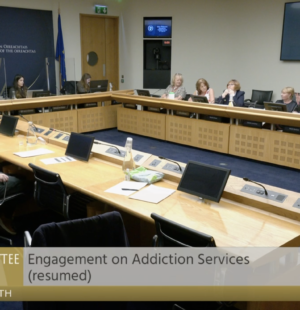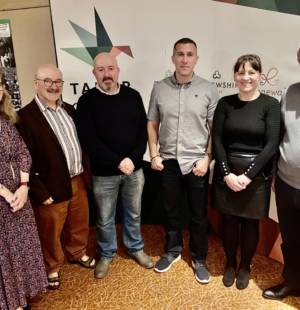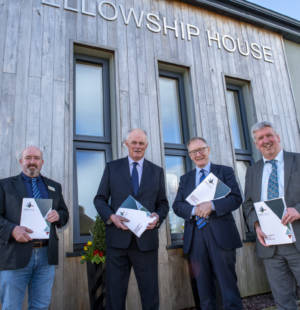National Drug Strategy launched by Taoiseach Leo Varadkar “Reducing Harm, Supporting Recovery
National Drug Strategy aims to provide an integrated public health approach to drug and alcohol use, focused on promoting healthier lifestyles within society.
An Taoiseach, Leo Varadkar, today joined Minister for Health Simon Harris and Minister of State Catherine Byrne to launch “Reducing Harm, Supporting Recovery – a health led response to drug and alcohol use in Ireland 2017-2025”.
Reducing Harm, Supporting Recovery lays out the direction of government policy on drug and alcohol use until 2025. The new strategy aims to provide an integrated public health approach to drug and alcohol use, focused on promoting healthier lifestyles within society.
National Drug Strategy
The strategy contains an ambitious 50 point Action Plan from 2017 to 2020, and provides the scope to develop further actions between 2021 and 2025 to ensure the continued relevance of the strategy to emerging needs into the future.
The vision of the strategy is to create a healthier and safer Ireland, and its actions will contribute towards improving the health, wellbeing and safety of the population of Ireland in the coming years.
Launching the strategy the Taoiseach said “For the ideal of a Republic of Opportunity to be meaningful, it must apply to all. Treating substance abuse and drug addiction as a public health issue, rather than a criminal justice issue, helps individuals, helps families, and helps communities. It reduces crime because it rebuilds lives. So it helps all of us.
“Ireland has a problem with substance misuse. Rates of drug use in Ireland have risen significantly over the past decade, with the greatest increases among younger people. These issues highlight the need to intervene effectively to reduce the harms associated with substance misuse, and combat the underlying reasons for the demand for drugs. Reducing Harm, Supporting Recovery represents a whole-of-government response to the problem of drug and alcohol use in Ireland. It recognises the importance of supporting the participation of communities in key decision making structures, so that their experience and knowledge informs the development of solutions to solve problems related to substance misuse in their areas. It emphasises a health-led response to drug and alcohol use, based on providing person-centred services that promote rehabilitation and recovery.
“I welcome the initiative of the Minister for Health, Simon Harris TD and the Minister of State for Health Promotion and the National Drugs Strategy, Catherine Byrne TD, for bringing forward this strategy to respond to the problem of drug and alcohol use in Ireland. This Government will work to build a Republic of Opportunity that means something in people’s lives. Especially those who have not had many opportunities in the past.”
Key actions of Reducing Harm, Supporting Recovery include:
- Introduction of a pilot supervised injecting facility in Dublin’s city centre;
- Establishment of a Working Group to examine alternative approaches to the possession for personal use of small quantities of illegal drugs;
- Funding for a programme to promote community awareness of alcohol-related harm;
- A new targeted youth services scheme for young people at risk of substance misuse in socially and economically disadvantaged communities;
- Expansion of drug and alcohol addiction services, including residential services;
- Recruitment of 4 Clinical Nurse Specialists and 2 Young Persons Counsellors to complement HSE multi-disciplinary teams for under 18s;
- Recruitment of 7 additional drug-liaison midwives to support pregnant women with alcohol dependency;
- Establishment of a Working Group to explore ways of improving progression options for people exiting treatment, prison or community employment schemes, with a view to developing a new programme of supported care and employment.
- The early Work Programme of the Standing Sub-Committee will focus on Drug-related Intimidation, pending the outcome of the respective evaluations of the Drug-related Intimidation Reporting Frameworks by An Garda Síochána and the National Family Support Network.
Speaking at the launch, Minister for Health Simon Harris said “In Ireland today it’s estimated that there are up to 1.35 million harmful drinkers, while one in four adults have tried an illegal drug at least once in their lifetime. It is clear that we need to act now to tackle the huge problem we have, as a country, with drug and alcohol use. If we are to reduce the dreadful harm caused and support recovery, then we must ensure that all of our efforts are person-centred and health-led. We must ensure that this ambitious new strategy is about action and delivery.
The Minister added “I welcome the focus in Reducing Harm, Supporting Recovery on improving access to drug and alcohol treatment and rehabilitation services. I am especially glad to see specific commitments in the strategy to expand services for young people under 18 and to recruit more Drug Liaison Midwives to work with pregnant women with substance misuse issues. We must all work together now to respond to Ireland’s drug and alcohol problem and ensure the ambitious but achievable actions contained in “Reducing Harm, Supporting Recovery” are implemented in full, for the good of all of our people.”
Minister of State for Health Promotion and the National Drugs Strategy, Catherine Byrne said “Ireland has a high level of alcohol consumption and many Irish people engage in harmful drinking patterns, which have significant health, social and economic costs. I welcome the fact that under this strategy, Drug and Alcohol Task Forces will be resourced to continue their work in raising awareness in communities of alcohol-related harm.”
John Carr, Chairman of the National Drugs Strategy Steering Committee said “The development of this strategy involved a wide range of sectors, stakeholders and interests working together. If we harness this energy, I have no doubt that we can deliver on the ambitious goals in this strategy.
ENDS
Notes to Editors
#ReducingHarm #SupportingRecovery – the full report is available to download from the Department of Health’s website at www.health.gov.ie.
Progress to date
Since 2011 the Government has done much to improve access to treatment and provide a wider range of services for those who develop health problems as a result of the consumption of alcohol and other drugs.
Methadone maintenance treatment is more widely available, particularly in inner city areas, and in those parts of the country with higher rates of heroin use.
Local and Regional Drug and Alcohol Task Forces (DATFs) have supported the development and expansion of integrated and accessible community-based services. This has resulted in greater access at local level to harm reduction initiatives, such as methadone and needle exchange and other wrap-around services and supports, such as advice and information, family support, childcare and complementary therapies.
Additional funding has increased the number of residential addiction beds providing treatment, detoxification and aftercare services.
More than €6 million was allocated for drugs initiatives in 2016, including €5 million for Task Force projects and around €1 million for the National Advisory Committee on Drugs and Alcohol, the National Family Support Network and the Citywide Drugs Crisis Campaign.
An additional €3 million was allocated in Budget 2017 to support:
· a pilot supervised injecting facility in Dublin city centre (expected to be open by the end of 2017);
· phased increase from Q3 2017 in the availability of buprenorphine/naloxone treatment as an alternative treatment for the identified cohorts of patients for whom methadone treatment is not suitable;
· fill gaps in addiction service provision for under 18s;
· and provide more detox places in community and residential settings next year.
However more needs to be done. In particular there is a need for wider access across Ireland to addiction services and to continue diversifying the range of treatment options available to meet current and emerging needs. The launch of this strategy is the first step on that road.
Need for the Strategy
The nature and scale of the drug problem has changed since the inception of the 2009-2016 strategy. An up-to-date strategy is required to meet current patters of drug and alcohol use.
The 2014/15 drugs prevalence survey found that one in four Irish adults (26.4%) has tried an illegal drug at least once in their lifetime. In common with other European countries, the use of cannabis is considerably higher than any other form of illegal drug, with 6.5% of adults using this drug in the last year. Trends over the past decade point to an increase in the rate of recent and current drug use, with the greatest increases in amongst younger people aged 15-34. While heroin use has stabilised, it is still a significant issue in Ireland. There are currently about 10,000 people availing of methadone treatment.
New patterns of drug use and related harms have emerged over the past decade that need to be considered in developing an effective response to the drug problem. These include high risk behaviours associated with substance use, increased use of cannabis and ecstasy, particularly amongst younger people, and a rise in cannabis-related problems that may be associated with the increased use of more potent strains of domestically produced herbal cannabis.
One of the most devastating consequences of problem drug use is drug-related poisonings that lead to a loss of life. Data from the National Drug-Related Deaths Index (NDRDI), a national surveillance database which records drug-related deaths and deaths among drug users (such as those due to Hepatitis C and HIV), shows overdose deaths increased in Ireland from 301 in 2005 to 354 in 2014, representing an increase of 17.6%.
Developing the National Drug Strategy
On 8 December 2015, the Minister of State with responsibility for the National Drugs Strategy established a Steering Committee to advise on the development of a new strategy and appointed an independent chair to guide the Committee in its work. To enable engagement with statutory, community and voluntary bodies who have a role in the delivery of the objectives of the Strategy, the Steering Committee convened four focus groups. Each focus group was asked to give their views on the relevance of the 2009-2016 strategy and to identify any gaps that should be addressed. A focus group was established to examine each of the following areas:
– Supply reduction;
– Education and Prevention;
– Continuum of care, encompassing treatment, rehabilitation and recovery; and
– Evidence and best practice.
Reducing Harm, Supporting Recovery was also informed by a public consultation which was undertaken by RPS Project Communications, (part of the RPS group), on behalf of the Department of Health. The aim of the public consultation was to engage with the general public, people who use services, families, communities and organisations and to obtain their views on the drugs issue in Ireland to help inform the new strategy. Nearly 3,000 individuals and organisations from across Ireland provided feedback to the public consultation.
The Health Research Board (HRB) commissioned the Centre for Public Health at Liverpool John Moores University to prepare a trends analysis on the drugs situation in Ireland and a report on the most recent international evidence on responses to problem drug use.
In addition, the Minister appointed an independent international expert panel to carry out a rapid review of the 2009-2016 strategy. The panel was chaired by Paul Griffiths, Scientific Director, EMCDDA and included Professor Sir John Strang, Director, National Addictions Centre, Kings College London and Nicola Singleton, Scientific Analyst, EMCDDA. The main objectives of the Rapid Expert Review were to examine the progress and impact of the strategy and to highlight areas for consideration in the development of the new strategy. The report is available on the Department of Health website www.health.gov.ie.
Vision and Goals of the National Drug Strategy
The Vision of Reducing Harm, Supporting Recovery is as follows:
“A healthier and safer Ireland, where public health and safety is protected, and the harms caused to individuals, families and communities by substance misuse are reduced and every person affected by substance misuse is empowered to improve their health, wellbeing and quality of life”
The National Drug strategy sets out five goals that will be crucial to the achievement of this vision, with objectives pertaining to each goal. The goals are as follows:
- Promote and protect health and wellbeing.
- Minimise the harms caused by the use and misuse of substances and promote rehabilitation and recovery.
- Address the harms of drug markets and reduce access to drugs for harmful use.
- Support participation of individuals, families and communities.
- Develop sound and comprehensive evidence-informed policies and actions.
Key actions related to Goal 1:
- New Community Action on Alcohol Programme
- Annual Conference on Substance Use Education
- Commencement and Roll out of Wellbeing Guidelines in Schools
- Targeted Youth Services Scheme for Disadvantaged Communities
Key actions related to Goal 2:
- Introduction of a Pilot Supervised Injecting Facility
- Recruitment of 7 additional Drug Liaison Midwives
- Recruitment of 4 Clinical Nurse Specialists and 2 Young Person’s counsellors to complement multi-disciplinary teams for under 18s
- Expansion of residential treatment services
- New Mental Health Clinical Programme to address Dual Diagnosis
Key actions related to Goal 3:
- Establishment of Working Group to consider approaches to possession of small quantities of drugs for personal use and to report back in 12 months
- Measures to reduce driving under the influence of drugs
- Provide funding in the capital expenditure programme for the construction of a purpose built new laboratory for Forensic Science Ireland, with €6m prioritised to commence the project immediately.
Key actions related to Goal 4
- Develop a measurement tool to assess the impact of drug-related crime on community life.
- Support and promote community participation in all local, regional and national structures.
- Strengthen the effectiveness of the drug-related intimidation reporting programme.
Key actions related to Goal 5
- Develop a prioritised programme of drug and alcohol related research on an annual basis.
- Support evidence-informed practice and service provision
- Performance Measurement
- The introduction, of a Performance Measurement System, incorporating a Resource Allocation Model (RAM), to achieve a more equitable distribution of resources across Task Force areas and strengthen the performance of the strategy.
3. Implementation of National Drug Strategy
A national oversight committee will provide leadership and direction to ensure that at the local level, staff from all relevant departments and agencies is engaged in supporting the implementation of the strategy. This committee will meet on a quarterly basis, be sponsored by the Minister of State and its members will be drawn from the community, voluntary and statutory sectors. The National Oversight Committee will have the following terms of reference:
- To give leadership, direction, prioritisation and mobilisation of resources to support the implementation of the strategy;
- To measure performance in order to strengthen the delivery of drugs initiatives and to improve the impact on the drug problem;
- To monitor the drugs situation and oversee the implementation of a prioritised
programme of research to address gaps in knowledge; - To ensure that the lessons drawn from evidence and good practice inform the development policy and initiatives to address the drug problem; and
- To convene Sub-Committees, as required, to support implementation of the strategy.
A standing sub-committee on implementation support will be established under the aegis of the national committee. The national committee will set the terms of reference, operational procedures and membership of the standing sub-committee. In general terms, it is expected that the standing sub-committee will be responsible for ensuring good governance, performance and accountability by the DATFs. In this context, it will play a key role in building the capacity of DATFs. The standing committee will report to the national committee.
The national oversight committee will establish other sub-committees, as it sees fit, to address specific issues and to harness relevant expertise to enable it to deliver on its key functions. Such committees will be required to report to the national committee.
Tabor Group
Tabor Group is a leading provider of residential addiction treatment services in Ireland. We provide support and care to hundreds of clients each year suffering from addictions to alcohol, substances, gambling and food. Tabor Group offers hope, healing and recovery to addicted people and their families through integrated and caring services. For more information on Tabor Group’s services Click Here
Get Help at Tabor Group
If you or a loved one are suffering from an addiction to Alcohol, Drugs, Gambling or Food get help today. We can help you recover in a healthy, friendly environment and beat your addiction. Don’t hesitate to contact one of our counsellors today at +353 (21) 488 7110 or Email Us and we can help you
With the right support, you’ll never have to make another uneducated life and death decision for your addicted loved one again
National Drug Strategy, National Drug Strategy, National Drug Strategy , National Drug Strategy, National Drug Strategy, National Drug Strategy, National Drug Strategy
Recent Posts
- Statement from Colette Kelleher, CEO Tabor Group
- The Influence of Alcohol on Women in the Workplace
- How do I know if my loved one has a drinking problem?
- Understanding the Impact of Alcohol on Our Bodies and Well-Being
- Men and the Stigma of Addiction
Categories
Archives
- January 2024
- December 2023
- August 2023
- July 2023
- May 2023
- April 2023
- March 2023
- January 2023
- October 2022
- September 2022
- August 2022
- July 2022
- June 2022
- May 2022
- April 2022
- March 2022
- February 2022
- January 2022
- December 2021
- November 2021
- October 2021
- September 2021
- August 2021
- July 2021
- June 2021
- May 2021
- April 2021
- March 2021
- February 2021
- January 2021
- December 2020
- November 2020
- October 2020
- September 2020
- August 2020
- July 2020
- June 2020
- May 2020
- April 2020
- March 2020
- February 2020
- January 2020
- December 2019
- November 2019
- October 2019
- September 2019
- August 2019
- July 2019
- June 2019
- May 2019
- April 2019
- March 2019
- February 2019
- January 2019
- December 2018
- November 2018
- October 2018
- September 2018
- August 2018
- July 2018
- June 2018
- May 2018
- April 2018
- March 2018
- February 2018
- January 2018
- December 2017
- November 2017
- October 2017
- September 2017
- August 2017
- July 2017
- June 2017
- May 2017
- April 2017
- March 2017
- February 2017
- January 2017
- December 2016
- November 2016
- October 2016
- September 2016
- August 2016
- July 2016
- April 2016
- March 2016
- December 2015
- March 2015












